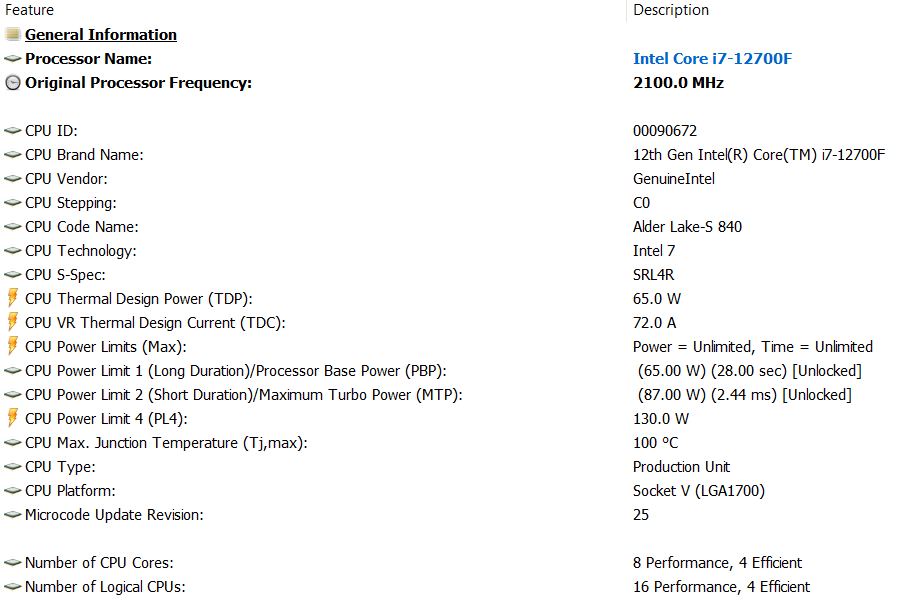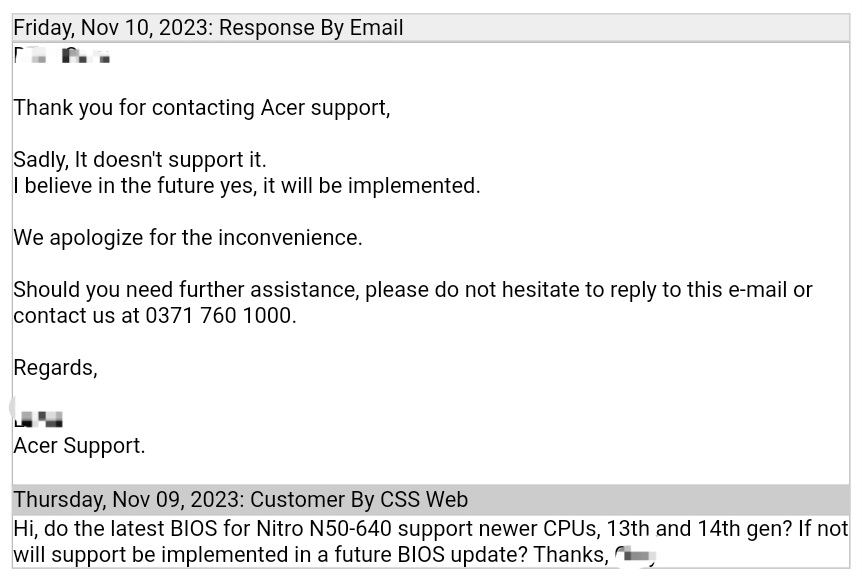Worth a shot, but in my experience OEMs aren't keen on doing that because of the testing/validation process they go through. I've got a few boards that can technically support a newer generation but they can't be updated because the OEM won't allow it.May be worth writing to Acer support and asking them to add support for newer CPUs.
-
Competitor rules
Please remember that any mention of competitors, hinting at competitors or offering to provide details of competitors will result in an account suspension. The full rules can be found under the 'Terms and Rules' link in the bottom right corner of your screen. Just don't mention competitors in any way, shape or form and you'll be OK.
You are using an out of date browser. It may not display this or other websites correctly.
You should upgrade or use an alternative browser.
You should upgrade or use an alternative browser.
i7 12700f multi-core is under performing
- Thread starter Boomstick777
- Start date
More options
Thread starter's posts- Joined
- 2 Jan 2012
- Posts
- 12,415
- Location
- UK.
I've emailed ACER support to see if the system can support 13th and 14th gen now, or if it will be implemented in the future. Worth a shot.
I'm not sure you would actually gain much benefit from 13th or 14th gen though, while I don't know what the IPC improvement was from 12th to 13th gen it's bascially nothing from 13th to 14th gen, the improvements have come via clockspeed increases which mean it draws more power to hit those clocks. We saw a much greater improvement from 12th to 13th gen, but, I belieive 'most' of it was clockspeed related rather than IPC so much and that is why 13th gen pulls much more power than 12th gen. Point being, with a hard limit on how much power the board can feed the chip, I think putting anything faster in there would be pointless becuase it can't get the power to actually realise that.
Last edited:
I'm not sure how much of the performance is the clock, but I believe there was one big change between 12th and 13th (though only on the 13600K and up), which is that the cache was increased from 1.25 to 2MB L2 cache per P-Core and each set of 4 E-Cores gets 2MB more.'most' of it was clockspeed related rather than IPC so much and that is why 13th gen pulls much more power than 12th gen.
- Joined
- 2 Jan 2012
- Posts
- 12,415
- Location
- UK.
have you tried to undervolt the CPU in bios?
if you pump less in your would still hit the throttle limit, but with more performance
No options unfortunately, just the generic OEM locked down BIOS things. I can live with it's limitations now I know it's not a fault or something if that makes sense.
Will be interesting to see if these are upgradable to 13th and 14th gen though, I would like to able to throw in an i7 13790F in the future. Will see what ACER say.
Edit: i see whats happened now, the system was made for an 12400 and you have dropped an i7 in. so yes the OEM as locked the motherboard to only run the supplied i5No options unfortunately, just the generic OEM locked down BIOS things. I can live with it's limitations now I know it's not a fault or something if that makes sense.
Will be interesting to see if these are upgradable to 13th and 14th gen though, I would like to able to throw in an i7 13790F in the future. Will see what ACER say.
If the cpu is not boosting as advertised by intel then you have grounds to complain to the oem. You ordered X system based on X performance and your multi score is about 40% down.
I would not be happy
Last edited:
Man of Honour
- Joined
- 23 Mar 2011
- Posts
- 18,794
- Location
- West Side
It's a common tactic to power limit CPU's in OEM builds (especially intel flamethrower CPU's ) to keep temps down . Then when upgrading to more a power hungry Cpu it can't reach its full potential.
Last edited:
Yea but he has changed the CPU from the one it was sold with as I read it so not really, they wont be at all interested other than to void his warranty if there is any I expect in Acer's case.Edit: i see whats happened now, the system was made for an 12400 and you have dropped an i7 in. so yes the OEM as locked the motherboard to only run the supplied i5
If the cpu is not boosting as advertised by intel then you have grounds to complain to the oem. You ordered X system based on X performance and your multi score is about 40% down.
I would not be happy
Also, the 12700f is a 65w part although it can draw more to achieve PL2 boost, many of the motherboards we would buy can of course run this at full PL2 boost unlimited all the time but that's not really how the CPU's are specced when you look into it and nor is it how you should really expect them to behave in a pre-built on some cost-down OEM motherboard. The way Intel chips are 'expected' to behave though is as clear as mud for the most part, but also, bear in mind Power Limits are exactly that, Limits not targets.
My take is that a 12700F should live upto it's spec sheet if fed 65w constantly which it looked like it was from the numbers shown, under certain cirumstances and with good enough hardware it can pull more for a time though and actually can be told to just run full PL2 all the time by the Bios but that's not Intel's spec strictly speaking it's down to the board vendor. But, as I say, it's all a bit murky to say the least.
Last edited:
- Joined
- 2 Jan 2012
- Posts
- 12,415
- Location
- UK.
Side note >> i7 12700f is on the PC's upgrade compatibility list..
With regard to headroom, even with PL1 and PL2 limits set to unlimited, CPU behavior is still the same. PL4 is set to 130.0 W.

With regard to headroom, even with PL1 and PL2 limits set to unlimited, CPU behavior is still the same. PL4 is set to 130.0 W.

Last edited:
- Joined
- 2 Jan 2012
- Posts
- 12,415
- Location
- UK.
Acer replied, looks like there might be some hope for future upgrade options.


I haven't had an Intel chip since my 10700 which was several chips ago for me now (actually I do have a 12500H in my laptop but I can't do anything with that really so doesn't count for this discussion) but there was a significant difference in the performance of that chip if I locked it down to strictly Intel specs in terms of power delivery or just let the motherboard run it with the shackles off and pull down as much power as it wanted for maximum boost all the time, which it could do quite happily and it probably was something like a 40% difference in all core workload performance iirc, for gaming and lighter threaded workloads it didn't make much if any difference though. I expect the newer chips behave similarly.
Last edited:

